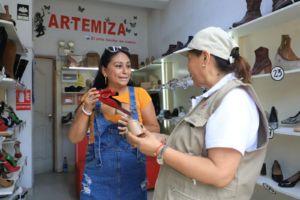
The Comisión Nacional de la Micro y Pequeña Empresa (CONAMYPE), through the FECAMYPE trust, announced the implementation of a strategy focused on expanding access to credit and strengthening the financial literacy of Salvadoran businesses, with a particular emphasis on the economic empowerment of women.
According to the institution, programs such as the “Línea Desarrollo Mujer” and “Línea Impulsa MYPE” are being used to bring financial resources to women-led businesses, a sector that has historically faced barriers to accessing the traditional banking system. The strategy is not limited to providing capital; it also integrates a technical component that includes field visits, support during the application process, and guidance on business formalization, to guarantee the sustainable use of the funds.
A comprehensive approach to closing economic gaps
The approach adopted by CONAMYPE responds to recurring recommendations from organizations such as the IDB and ECLAC, which emphasize the importance of combining financing with financial education to avoid the risks of over-indebtedness and improve business stability.
Studies by the Observatorio MYPE of Fusai and specialized publications indicate that, although women lead a significant portion of microenterprises in El Salvador, many operate with low levels of capitalization and high financial vulnerability. Furthermore, the lack of collateral remains one of the main obstacles to accessing formal credit, according to the EHPM and the Banco Central de Reserva.

Impact on formalization and productivity
Recent efforts are also aligned with the national strategy to integrate the MSME sector into the formal economy. According to UNDP analysis, the so-called “informality trap” can be broken when entrepreneurs find tangible incentives such as access to credit linked to the formalization process.
The FECAMYPE initiative seeks to reduce information asymmetries and provide administrative tools that enable women-led businesses to migrate from subsistence models to more productive and sustainable models.
Economic outlook
The integration of financing and technical training represents an important step toward the maturation of El Salvador’s entrepreneurial ecosystem. While credit products alleviate liquidity needs, their true economic value lies in improving business management, increasing productivity, and promoting women’s participation in value chains.
If maintained and expanded, this strategy could help reduce gender gaps in access to capital, strengthen the financial resilience of the MSME sector, and boost the country’s economic activity.
You can also read:







